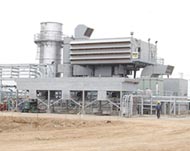US shifts from dollar to dinar in Iraq
The US military has started paying Iraqi contractors in dinars instead of dollars, a step that comes amidst reports of a dramatic increase in spending on security.

On 14 October, “a 3rd Infantry Division finance office issued the first payment in Iraqi currency while in theater,” a US military statement said on Tuesday.
Iraqis continue to be paid mostly in dollars for goods and services provided to US-led forces, but for the first time, “a dinar check (cheque) payment has been issued to local vendors and contractors within the Baghdad area”.
US financial officer Major Richard Santiago pointed out the advantages of using the Iraqi currency.
“Issuing dinar check payments improves the economic and financial stability of Iraq by promoting the Iraqi banks while using their local currency,” he explained.
“It also decreases the cash requirements our finance offices need in order to meet mission requirements, as we are now able to pay the local vendors and contractors with a check instead of cash.
“This is truly a win-win situation for all.”
‘Benefits’
First Lieutenant Tayonia Williams said: “Paying Iraqis in their own currency also has the benefit of limiting the large amount of cash that vendors and contractors have to carry after getting paid for their supplies and services.”
Santiago added that “by limiting the US dollars in the region, we are cutting down the dollars that could possibly be used by insurgents.”
|
The US-led portion of Iraq‘s reconstruction concludes, many planned projects will remain on the drawing board for execution by other funding sources”. Stuart Bowen’s report |
By issuing cheques drawn on local banks, the change should also help improve Iraq‘s financial infrastructure.
Ultimately all local vendors and contractors will be paid in dinars, but the major could not say when that would happen.
“It is difficult to estimate when we will reach this point, but just to disseminate funds in their currency is a major step in the right direction,” he said.
Drawing board
Many US-financed reconstruction projects in Iraq are unlikely to get off the drawing board because of soaring security costs related to the fighting in Iraq, a report to Congress released on Monday said.
The report by the special inspector general for Iraq reconstruction, Stuart Bowen, said American contractors account for 120 of the 147 US civilians killed in Iraq since March 2003.
Security costs now account for 25% of the nearly $30 billion appropriated by the US for reconstruction projects in Iraq, said the report, which covers the three month period ending 30 September.
The dramatic increase in spending on security “has proportionately reduced funds for other reconstruction projects,” the report said.
Growing gap
Bowen warned that there is a growing gap between the number of projects the US orignally proposed building in Iraq and those it will ultimately complete.
Besides rising security costs, projects have been plagued by increased costs of materials, project delays, cost overruns, and multiple changes in reconstruction priorities, he found.
Bowen said hundreds of millions of dollars more also will have to be spent training Iraqis to take over and maintain projects once they have been completed.
 |
|
Projects will have to maintained |
“The US-led portion of Iraq‘s reconstruction concludes, many planned projects will remain on the drawing board for execution by other funding sources,” his report said.
The report highlighted the difficulties besetting a massive reconstruction program in the midst of a fierce resistance.
It quoted from incident reports detailing the impact of kidnappings, ambushes, telephoned threats and anti-US attacks on projects around the country.
Insurance claims
The report said the number of insurance death-claims filed during the quarter by contractors from all countries rose by 82, or 70%, from the previous quarter.
It put the total number of non-Iraqi contractor deaths at 412 from March 2003 to 30 September 2005.
The number of death and injury claims filed with the US Department of Labour was up 24% from the previous quarter, the report said. Those claims have totalled 4208 since April 2003, it said.
Of 147 US civilians killed since the war began, 117 lost their lives as a result of “terrorist action,” it said, citing State Department statistics. Three other deaths were homicides and the remainder were caused either by vehicle accidents or natural causes.
At least 25,000 non-Iraqis currently work as private security contractors in Iraq, the report said, citing Defense Department estimates. Other studies have concluded that 6000 of them serve in armed tactical roles, it added.
“During the last two reporting quarters, 66% of the US contractors killed in Iraq were working for private security companies,” the report said.